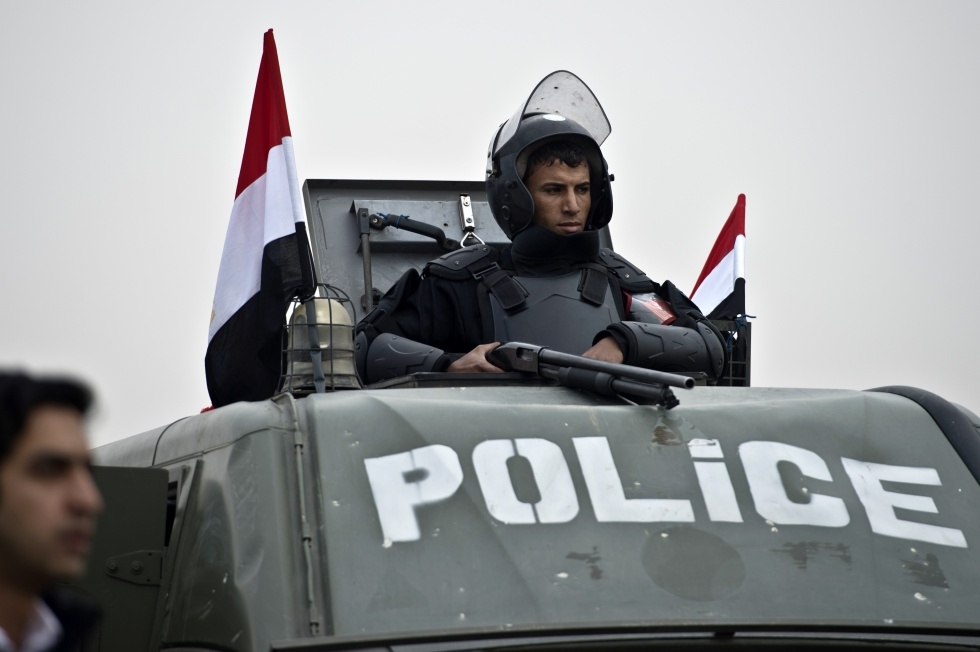Egypt's once-feared police on guard against 'unseen enemy'

By Haitham El-Tabei
CAIRO - Colonel Amr has forbidden his family to discuss his police work; with militants relentlessly targeting Egypt's security forces he remains perpetually on guard against what he says is "an unseen enemy".
"Every day one of our colleagues becomes a martyr," says Colonel Amr, a stout man in his 40s.
Since the military deposed president Mohamed Morsi on July 3, militants have increasingly singled out members of Egypt's once-feared security forces for attack.
Official figures show that more than 500 people -- mostly policemen and soldiers -- have been killed in bombing and shooting assaults by militants since that date.
New MEE newsletter: Jerusalem Dispatch
Sign up to get the latest insights and analysis on Israel-Palestine, alongside Turkey Unpacked and other MEE newsletters
The killings are generally claimed by groups who say they are in retaliation for a brutal police crackdown on Morsi's supporters, which has left more than 1,400 people dead.
As with a number of police officers interviewed by AFP Amr, who has been in service for 25 years, refused to disclose personal details and agreed to reveal only his first name.
Policemen have been living in "anxiety and tension" since the ouster of Morsi, he says, adding that his police station was in central Cairo, an area that has witnessed several attacks in the past few months.
Egypt's police, feared for decades, had faced massive public anger during the uprising against veteran president Hosni Mubarak in early 2011.
It managed to rehabilitate itself in the eyes of the public by pursuing supporters of the unpopular Morsi in the wake of his ouster, but in doing so incurred the wrath of militants.
Groups such as the Sinai-based Ansar Beit al-Maqdis have claimed most of the attacks against the security forces.
'Fighting an unseen enemy'
Amr says the toughest part "is fighting an unseen enemy whose strength we don't know".
The authorities blame Morsi's Muslim Brotherhood for the attacks and have designated it as a "terrorist group".
The Muslim Brotherhood, which swept all elections since the fall of Hosni Mubarak, denies this and regularly condemns attacks targeting security forces.
Amr is not alone in his caution -- his entire unit, based in a police post on the banks of the Nile, has become more vigilant.
It has removed all identification signs from the building and becomes extra-cautious on a Friday, when pro-Morsi protesters pass by on their way to stage public rallies, which often degenerate into street clashes with security forces.
Amr has even repainted the police-supplied car used by his family.
"It was blue, now it is white because I was afraid it could be set on fire or attacked when my family was travelling in it," he says.
"I also removed all signs that were displayed on my own police car."
His wife Noha is also worried.
"I don't introduce myself anymore as officer Amr's wife, especially to strangers, or when I order something on the phone", she says, adding that her husband's title once used to be "a source of pride" in a country where police were feared.
Another officer, Captain Hazem, is also a worried man these days and says he takes off his uniform the moment he finishes work.
"I am afraid it can make me a target," says Hazem, who is also stationed in Cairo.
That concern runs deep and in the Nile Delta province of Sharqiya, where at least 10 policemen have been killed since January, personnel have been ordered only to wear their uniforms inside police stations.
On Thursday, a little known group Ajnad Misr (Soldiers of Egypt) vowed new attacks against security forces.
It promised to "mothers of those (pro-Morsi protesters) killed and detained ... that very soon they would be pleased," in a video posted on its Twitter account.
Threats via the Internet
The Internet too has become a platform for threatening policemen, with militants circulating lists of officers to be targeted complete with their names, addresses, and in some cases pictures of family members.
Many policemen who once proudly posted their pictures on social network sites have deleted them.
"Attacks targeting families are the most worrying," says Nasser Al-Abd, a police general in the Mediterranean city of Alexandria, who found out to his alarm that photographs of his daughters were being posted on the Internet as potential targets.
"My family is not responsible for anything and can't defend itself," says Abd.
The authorities say they have arrested 80 people for inciting violence against police through the Internet.
Security around police stations has also been tightened after 14 policemen were killed in a car bombing of police headquarters in the Nile Delta city of Mansoura in December.
Concrete walls have been erected outside police stations, while rows of barbed-wire and additional check-points have been set up on roads leading to them.
But Captain Hazem is unconvinced.
"Increasing police checkpoints means offering militants more targets and endangering more security personnel," he says, clearly worried.
Middle East Eye delivers independent and unrivalled coverage and analysis of the Middle East, North Africa and beyond. To learn more about republishing this content and the associated fees, please fill out this form. More about MEE can be found here.

